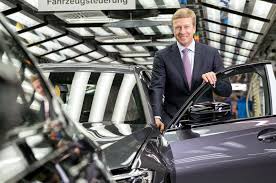BMW is the latest automaker to lay claim to climate-friendly credentials by outlining its new “sustainability and resource efficiency” strategy.
The German company says these two aims will become “central to the company’s strategic direction.” Oliver Zipse, chairman of the board of management (below, left), announces the first stages in this latest strategy setting out BMW’s targets to reduce CO2 emissions up to 2030.
For the first time, BMW will apply these targets throughout the lifecycle of its vehicles – from the supply chain, through production to end-of-use. It hopes to reduce CO2 emissions per vehicle at least one-third across this spectrum.
BMW calculates that for a fleet of some 2.5 million vehicles, its global vehicle production for 2019, this would see a reduction of more than 40 million metric tons of CO2 over the fleet’s lifecycle in 2030.
Starting next year, BMW will publish its financial figures and general business development in an integrated report that will include updates on its sustainability goals.
The automaker lists its prime targets for efficiencies starting with its own plants and sites, where it hopes to reduce CO2 emissions 80% in the coming decade, pointing out it already has lowered emissions per vehicle produced more than 70% since 2006. The main contributor for this is in production, which generates about 90% of the company’s Scope 1 and Scope 2 emissions. It also will fully offset its remaining CO2 emissions (Scope 1 + 2) from 2021 onwards with appropriate certificates.
In addition to sourcing 100% green power as of this year, the automaker promises to invest in further energy efficiencies and use data analytics to make its production more efficient, for example by reducing scrap parts in the body shop and through predictive maintenance for machinery.
Electrified powertrains also will play their part and BMW believes it can reduce CO2 emissions from vehicles by 40% per mile driven. It expects in the next 10 years to have more than 7 million electrified vehicles on the roads, two-thirds of them with a fully electric drivetrain.
BMW’s supply chain, too, will come under scrutiny especially with the growth in e-mobility. It pledges, for instance, to look at energy-intensive production of high-voltage batteries. BMW claims, without corrective measures, the growing share of electrified vehicles would mean CO2 emissions per vehicle from the supply chain would increase more than a third by 2030.
To prevent this, the automaker will assess a supplier’s carbon footprint which will inform its contract-award processes. BMW already has reached a contractual agreement with its cell manufacturers that they will only use green power to produce fifth-generation battery cells. This will save a total of about 10 million metric tons of CO2 over the next 10 years.
The company says resource management will play a central role in its business model. It points out that electromobility cannot rely solely on primary materials in the long term and that flow of resources needs to change. By making the recycling chain more transparent, BMW aims to create high-quality recycled material and to track the use of raw materials in the production cycle.
While its vehicles already are 95% recyclable, current production uses a comparatively low level of recycled materials. Now BMW plans to increase the share of recycled materials because their use significantly reduces CO2 emissions by roughly a factor of 3-4 for aluminum and a factor of 2-3 for cobalt, nickel and lithium.
With high-voltage batteries, it claims its partnership with German recycling specialist Duesenfeld has developed a method that can achieve a recycling rate of up to 96%, including graphite and electrolytes.
Zipse says: “As a premium car company, it is our ambition to lead the way in sustainability. That is why we are taking responsibility here and now and making these issues central to our future strategic direction. This new strategic direction will be anchored in all divisions – from administration and purchasing to development and production, all the way to sales. We are taking sustainability to the next level.”





